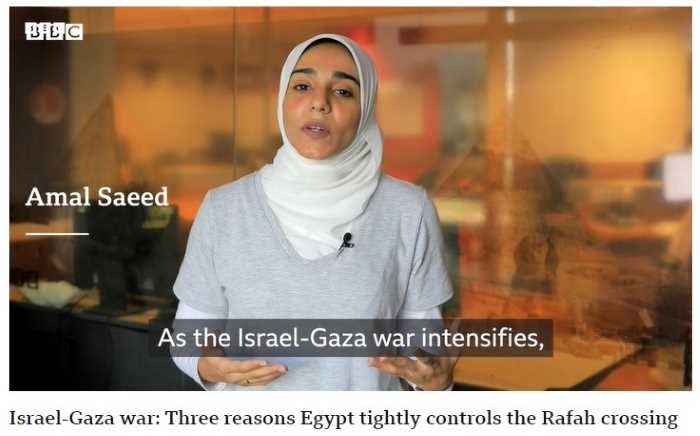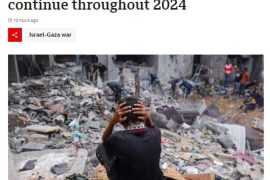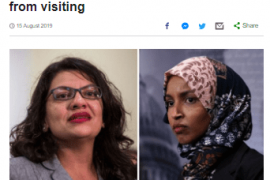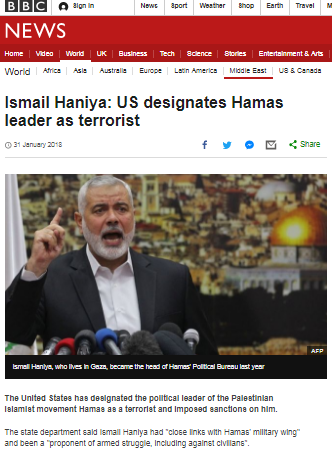As previously noted here, on November 2nd the BBC News website published a filmed report titled ‘Israel-Gaza war: Three reasons Egypt tightly controls the Rafah crossing’.
Presented by Amal Saeed of BBC Arabic in Cairo, that item however does not confine itself to the topic of Egypt’s policies concerning the crossing on its border with the Gaza Strip.
“The Rafah border crossing between Gaza and Egypt opened on Wednesday to allow a number of civilians to leave Gaza for the first time since the war began on 7 October.
The crossing has been open and shut frequently over the years. Why is it so contentious for Egypt? And where does Egypt stand in the Israel-Palestinian conflict?
The BBC’s Amal Saeed in Cairo explains.”
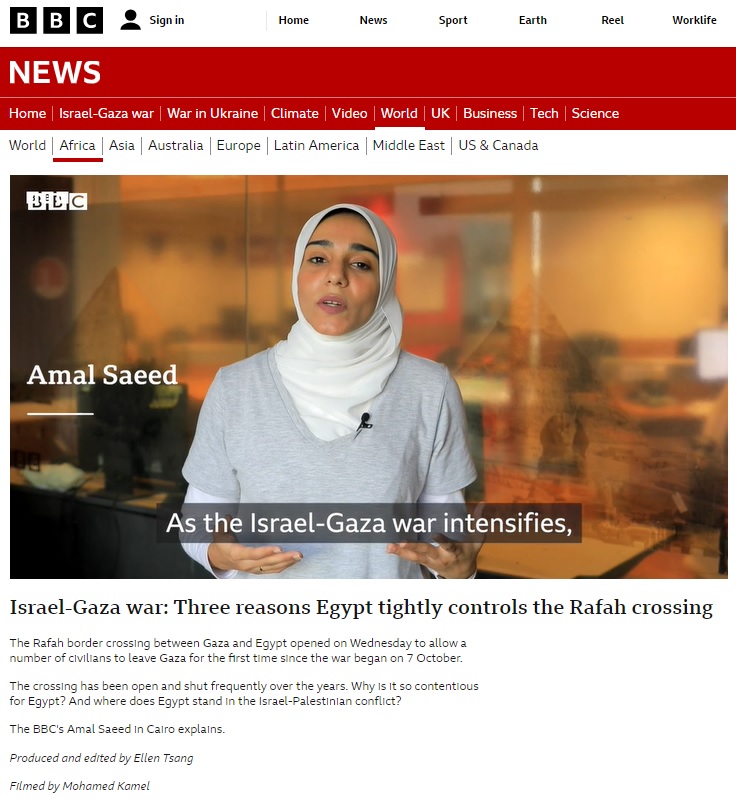
Saeed opens with a reference to the “Israel-Gaza war” despite the fact that Israel is not at war with Gaza, but with the proscribed terrorist organisation Hamas.
The three reasons cited by Saeed for Egypt’s tight control of the Rafah border crossing are security (she mentions the ISIS “militants” in Sinai), refugees (she states that Egypt does not have the ability to accommodate large numbers of Gaza Strip residents) and the “Palestinian cause”.
Saeed later presents viewers with her version of Egypt’s “complex history with Israel and Gaza”: [emphasis added]
“This goes back to 1948 when a war started between Israel and a handful of Arab countries, including Egypt, which ended in Egypt controlling Gaza.”
That portrayal clearly whitewashes the fact that the war was initiated by those Arab countries with the intention of annihilating the nascent Israeli state and that Egypt illegally occupied – rather than merely ‘controlled’ – territory assigned by the League of Nations for the creation of a Jewish homeland. Saeed goes on:
“In 1967 another war started between Israel and some Arab countries, including Egypt, ending with Israel taking over Gaza among other areas.”
Once again Egypt’s role in bringing about that second war intended to annihilate Israel is whitewashed by Saeed.
Erasing from audience view the fact that Israel withdrew from the Gaza Strip in 2005 as well as the violent nature of Hamas’ coup against the Palestinian Authority two years later, Saeed goes on:
“In 2007 Hamas took over Gaza and the situation on the border between Egypt and Hamas became more complex.”
Viewers are not given any explanation of what “more complex” means and are told nothing about topics such as Hamas’ cooperation with the Muslim Brotherhood in Egypt, Egypt’s imprisonment of Hamas operatives or the 2008 infiltration of the border by tens of thousands of Palestinians from the Gaza Strip.
Saeed fails to make any mention whatsoever of Hamas’ October 7th infiltration of Israel and the murderous rampages which sparked the current war throughout her entire almost four-minute-long report. Neither does she refer to the terror attack perpetrated by an Egyptian policeman against Israeli tourists in Alexandria the following day before going on to tell viewers about opinions on the Egyptian street that include “condemning what Israel did with the harsh bombardment of civilians”.
A particularly notable part of Saeed’s report refers to al Azhar Institute:
“On the ground you find al Azhar, which is the highest religious institute in Egypt, called what Israel is doing in Gaza a “genocide” and a “war crime”. Al Azhar is widely followed by Egyptians.”
Al Azhar – which is funded both by the Egyptian government and the UAE – is also widely followed by other Sunni Muslims elsewhere in the world, as the BBC surely knows full well. It is therefore particularly significant that BBC Arabic chose to amplify that institution’s redundant allegations of ‘genocide’ and ‘war crime’.
As recently reported by the INSS:
“The establishment that Egypt used to present as a beacon of “religious moderation” and the standard bearer of the ideological struggle against Islamic extremism has been revealed to be a supporter of terror. Since the outbreak of the war, al-Azhar has conducted a campaign designed to foment hostility in Arab-Muslim public opinion against Israel and its supporters in the West. […]
An initial response published by al-Azhar on the day of the October 7 attack, which saw the cold blooded murder of 1,400 innocent civilians and soldiers, Israelis and foreign nationals, and Jews and Arabs, as well as the rape of women and the abduction of elderly people, men, women, and children from their homes, stated that it “salutes with absolute pride the resistance efforts of the Palestinian people.” Al-Azhar also sought to “strengthen the proud Palestinian people who have breathed spirit and faith into us and restored us to life.” […]
…on October 18 al-Azhar issued a fatwa stating that “Zionist civilians on occupied land are not [at all] worthy of the description of ‘civilians,’ but they are occupiers of the land, usurpers of rights, deviants from the way of the prophets, who attack the historical holy places of Jerusalem.” The al-Azhar ruling that there are no “innocent’ Israeli citizens in effect makes it permissible to kill them.”
Nevertheless, the BBC chose to provide worldwide amplification on its website for hate speech put out by that institution.
Saeed’s report closes with a tepid portrayal of anti-Israel demonstrations in Egypt:
“There were also protests in Cairo and other Egyptian cities, with people raising the Palestinian flag, wearing the Palestinian scarf and chanting ‘free Palestine, victory for Gaza, open the border’.”
Saeed did not bother to inform BBC audiences that those demonstrations also included calls for Israel’s elimination. The topic of the Egyptian president’s unusual encouragement of demonstrations – and, relatedly, the upcoming presidential election in Egypt – was not addressed in Saeed’s account.
The BBC Cairo office’s uncritical amplification of talking points that are part of a propaganda campaign run by “the highest religious institute in Egypt” and the promotion of that messaging to world-wide audiences via the BBC News website and on BBC social media channels once again raises very serious questions about how the BBC interprets terms such as “trusted journalism” and “commitment to impartiality” which it uses in response to criticism of its reporting.
A media organisation that is on the one hand squeamish about using the term terrorism in entirely appropriate circumstances but on the other hand has no problem irresponsibly bandying about words such as ‘genocide’ and ‘war crimes’ (and Saeed is far from the only BBC employee to have done so) cannot expect to win public trust.
Related Articles:
OMISSIONS IN BBC REPORTING ON FOREIGN NATIONALS IN THE GAZA STRIP

